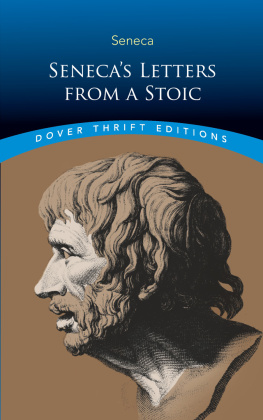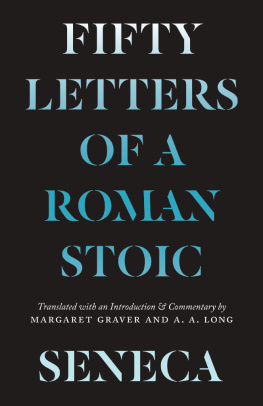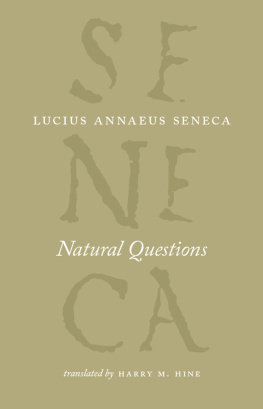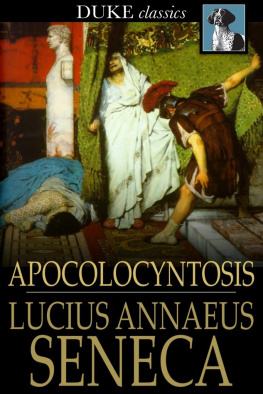On the Firmness of the Wise Man
(De Constantia Sapientis)
(1900)
by Seneca
translated by
Aubrey Stewart
THE SECOND BOOK OF THE DIALOGUES OF L. ANNAEUS SENECA, ADDRESSED TO SERENUS. "THAT THE WISE MAN CAN NEITHER RECEIVE INJURY NOR INSULT OR AN ESSAY ON THE FIRMNESS OF THE WISE MAN
Contents
I.
I MIGHT truly say, Serenus, that there is as wide a difference between the Stoics and the other sects of philosophers as there is between men and women, since each class contributes an equal share to human society, but the one is born to command, the other to obey. The other philosophers deal with us gently and coaxingly, just as our accustomed family physicians usually do with our bodies, treating them not by the best and shortest method, but by that which we allow them to employ; whereas the Stoics adopt a manly course, and do not care about its appearing attractive to those who are entering upon it, but that it should as quickly as possible take us out of the world, and lead us to that lofty eminence which is so far beyond the scope of any missile weapon that it is above the reach of Fortune herself. "But the way by which we are asked to climb is steep and uneven." What then? Can heights be reached by a level path? Yet they are not so sheer and precipitous as some think. It is only the first part that has rocks and cliffs and no apparent outlet, just as many hills seen from a long way off appear abruptly steep and joined together, because the distance deceives our sight, and then, as we draw nearer, those very hills which our mistaken eyes had made into one gradually unfold themselves, those parts which seemed precipitous from afar assume a gently sloping outline. When just now mention was made of Marcus Cato, you whose mind revolts at injustice were indignant at Cato's own age having so little understood him, at its having allotted a place below Vatinius to one who towered above both Caesar and Pompeius; it seemed shameful to you, that when he spoke against some law in the Forum his toga was torn from him, and that he was hustled through the hands of a mutinous mob from the Rostra as far as the arch of Fabius, enduring all the bad language, spitting, and other insults of the frantic rabble.
II .
I then answered, that you had good cause to be anxious on behalf of the commonwealth, which Publius Clodius on the one side, Vatinius and all the greatest scoundrels on the other, were putting up for sale, and, carried away by their blind covetousness, did not understand that when they sold it they themselves were sold with it; I bade you have no fears on behalf of Cato himself, because the wise man can neither receive injury nor insult, and it is more certain that the immortal gods have given Cato as a pattern of a wise man to us, than that they gave Ulysses or Hercules to the earlier ages; for these our Stoics have declared were wise men, unconquered by labours, despisers of pleasure, and superior to all terrors. Cato did not slay wild beasts, whose pursuit belongs to huntsmen and countrymen, nor did he exterminate fabulous creatures with fire and sword, or live in times when it was possible to believe that the heavens could be supported on the shoulders of one man. In an age which had thrown off its belief in antiquated superstitions, and had carried material knowledge to its highest point, he had to struggle against that many-headed monster, ambition, against that boundless lust for power which the whole world divided among three men could not satisfy. He alone withstood the vices of a worn-out State, sinking into ruin through its own bulk; he upheld the falling commonwealth as far as it could be upheld by one man's hand, until at last his support was withdrawn, and he shared the crash which he had so long averted, and perished together with that from which it was impious to separate him for Cato did not outlive freedom, nor did freedom outlive Cato. Think you that the people could do any wrong to such a man when they tore away his praetorship or his toga? when they bespattered his sacred head with the rinsings of their mouths? The wise man is safe, and no injury or insult can touch him.
III .
I think I see your excited and boiling temper. You are preparing to exclaim: "These are the things which take away all weight from your maxims ; you promise great matters, such as I should not even wish for, let alone believe to be possible, and then, after all your brave words, though you say that the wise man is not poor, you admit that he often is in want of servants, shelter, and food. You say that the wise man is not mad, yet you admit that he sometimes loses his reason, talks nonsense, and is driven to the wildest actions by the stress of his disorder. When you say that the wise man cannot be a slave, you do not deny that he will be sold, carry out orders, and perform menial services at the bidding of his master; so, for all your proud looks, you come down to the level of everyone else, and merely call things by different names. Consequently, I suspect that something of this kind lurks behind this maxim, which at first sight appears so beautiful and noble, that the wise man can neither receive injury nor insult. It makes a great deal of difference whether you declare that the wise man is beyond feeling resentment, or beyond receiving injury; for if you say that he will bear it calmly, he has no special privilege in that, for he has developed a very common quality, and one which is learned by long endurance of wrong itself, namely, patience. If you declare that he can never receive an injury, that is, that no one will attempt to do him one, then I will throw up all my occupations in life and become a Stoic."
It has not been my object to decorate the wise man with mere imaginary verbal honours, but to raise him to a position where no injury will be permitted to reach him. What? will there be no one to tease him, to try to wrong him? There is nothing on earth so sacred as not to be liable to sacrilege; yet holy things exist on high none the less because there are men who strike at a greatness which is far above themselves, though with no hope of reaching it. The invulnerable is not that which is never struck, but that which is never wounded. In this class I will show you the wise man. Can we doubt that the strength which is never overcome in fight is more to be relied on than that which is never challenged, seeing that untested power is untrustworthy, whereas that solidity which hurls back all attacks is deservedly regarded as the most trustworthy of all? In like manner you may know that the wise man, if no injury hurts him, is of a higher type than if none is offered to him, and I should call him a brave man whom war does not subdue and the violence of the enemy does not alarm, not him who enjoys luxurious ease amid a slothful people. I say, then, that such a wise man is invulnerable against all injury; it matters not, therefore, how many darts be hurled at him, since he can be pierced by none of them. Just as the hardness of some stones is impervious to steel, and adamant can neither be cut, broken, or ground, but blunts all instruments used upon it; just as some things cannot be destroyed by fire, but when encircled by flame still retain their hardness and shape; just as some tall projecting cliffs break the waves of the sea, and though lashed by them through many centuries, yet show no traces of their rage; even so the mind of the wise man is firm, and gathers so much strength, that it is as safe from injury as any of those things which I have mentioned.
IV .
"What then? Will there be no one who will try to do an injury to the wise man?" Yes, someone will try, but the injury will not reach him; for he is separated from the contact of his inferiors by so wide a distance that no evil impulse can retain its power of harm until it reaches him. Even when powerful men, raised to positions of high authority, and strong in the obedience of their dependents, strive to injure him, all their darts fall as far short of his wisdom as those which are shot upwards by bowstrings or catapults, which, although they rise so high as to pass out of sight, yet fall back again without reaching the heavens. Why, do you suppose that when that stupid ] clouded the daylight with the multitude of his darts, that any arrow of them all went into the sun? or that when he flung his chains into the deep, that he was able to reach Neptune? Just as sacred things escape from the hands of men, and no injury is done to the godhead by those who destroy temples and melt down images, so whoever attempts to treat the wise man with impertinence, insolence, or scorn, does so in vain. "It would be better," say you, "if no one wished to do so." You are expressing a wish that the whole human race were inoffensive, which may hardly be; moreover, those who would gain by such wrongs not being done are those who would do them, not he who could not suffer from them even if they were done; nay, I know not whether wisdom is not best displayed by calmness in the midst of annoyances, just as the greatest proof of a general's strength in arms and men consists in his quietness and confidence in the midst of an enemy's country.
Next page







